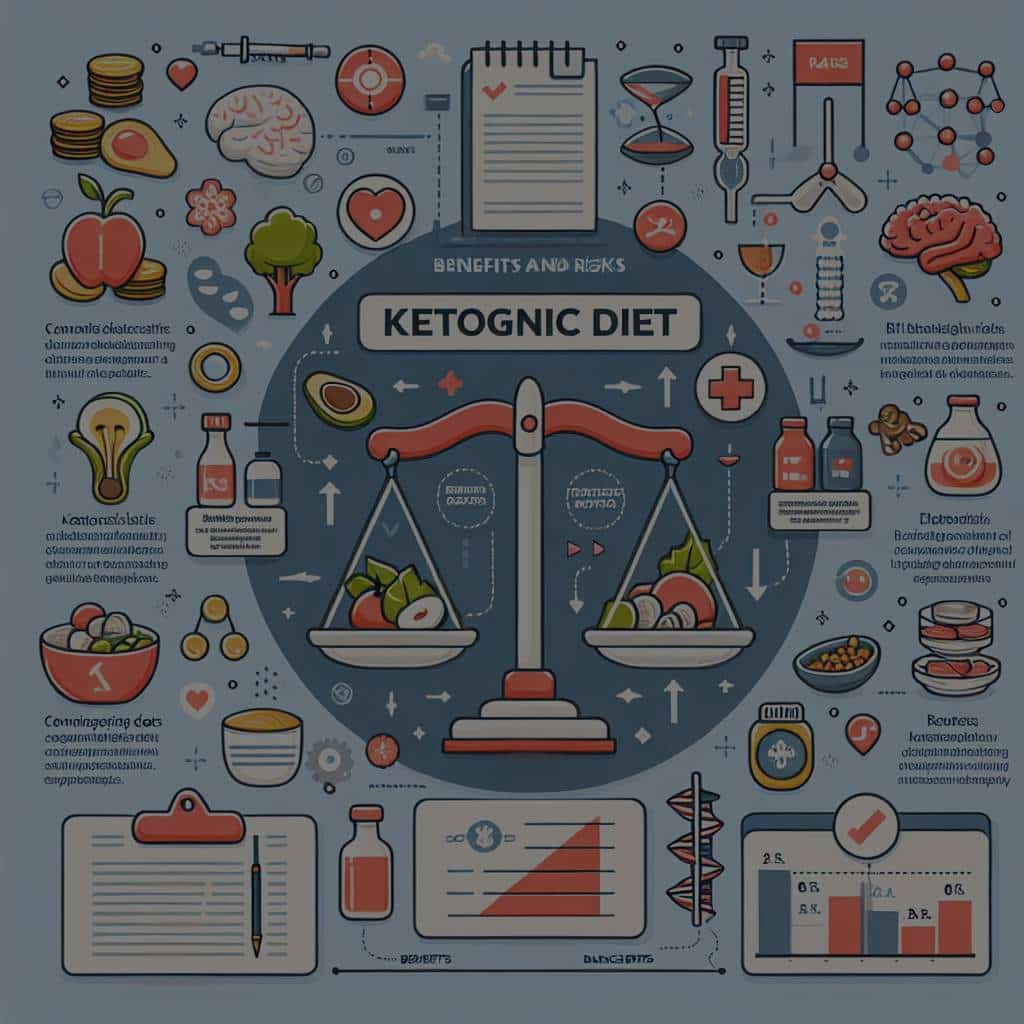The ketogenic diet, a dietary regimen high in fat and low in carbohydrates, is increasingly recognized as a potential treatment strategy in epilepsy management. But why are scholars and medical professionals, and even Google searchers, growing more interested in this diet? And how does it impact the brain, specifically in epilepsy patients? In this article, we delve into the research and studies surrounding the ketogenic diet, from its benefits to potential risks, particularly in the context of epilepsy treatment.
Understanding Epilepsy and the Need for Dietary Treatment
Epilepsy is a chronic neurological disorder characterized by recurrent, unprovoked seizures. According to Crossref, it affects approximately 65 million people worldwide – men, women, and children alike. The severity of seizures can vary from person to person, with some people experiencing mild, barely noticeable episodes, while others have severe seizures that can be life-threatening.
Also to read : Bloskin's essential components and their benefits
Despite the availability of various anti-seizure medications, a significant proportion of patients continue to suffer from uncontrolled seizures. This has led researchers and clinicians to explore alternative or complementary treatment approaches, with diet being one of them.
The Ketogenic Diet: An Emerging Treatment Strategy
The ketogenic diet, often referred to as ‘keto’, is a high-fat, low-carbohydrate diet that forces the body to burn fats rather than carbohydrates. This metabolic state, known as ‘ketosis’, has been found to have a neuroprotective effect, potentially mitigating the frequency and severity of seizures in people with epilepsy.
Additional reading : How Does Enhancing Indoor Air Quality Reduce Asthma Symptoms in Children?
Numerous studies have been conducted to explore this relationship. In one article published in Google Scholar, researchers found that children with Dravet syndrome, a severe form of epilepsy, experienced a 50% reduction in seizures after implementing a ketogenic diet. This diet is not only beneficial for this syndrome, but also for other forms of epilepsy.
However, whilst the ketogenic diet appears promising as a treatment strategy, it is not without its share of challenges and risks.
The Challenges and Risks of the Ketogenic Diet
While the ketogenic diet offers potential benefits for epilepsy treatment, it’s essential to acknowledge that it’s not suitable for everyone. Some people may find it difficult to adhere to the diet due to its restrictive nature, and there can be significant side effects, particularly in the initial stages.
Side effects can include fatigue, nausea, and headaches, often referred to as ‘keto flu’. More long-term, this diet can lead to deficiencies in certain nutrients, such as calcium, vitamin D, and B vitamins, leading to potential health issues if not properly managed.
Another concern is the potential impact on heart health, given the high fat content of the diet. While many of the fats encouraged on the ketogenic diet are considered ‘healthy fats’, such as avocados and nuts, there is still a potential risk. Particularly if people choose to consume high amounts of saturated fats.
The Role of Personalized Treatment and Future Research
The management of epilepsy is complex, requiring a personalized and multi-faceted approach. The ketogenic diet, while promising, is just one piece of the puzzle. It’s crucial to understand that this diet will not be effective or suitable for everyone with epilepsy, and it should not replace conventional treatment without a healthcare professional’s advice.
Despite the potential risks and challenges, research into the ketogenic diet as a treatment strategy for epilepsy is ongoing. Further studies are needed to fully understand its efficacy, the optimal diet composition, and the mechanisms by which it works to reduce seizures.
As an increasing number of people turn to Google to explore this potential treatment option, it’s essential that accurate, up-to-date information is readily available. This will ensure that those considering the diet are fully informed of the potential benefits, as well as the risks.
While the ketogenic diet offers potential hope for those struggling with epilepsy, it’s important to remember that it is not a standalone solution. It should be considered as part of a broader treatment plan, with ongoing monitoring and support from healthcare professionals.
So far, while the ketogenic diet is not without its challenges, the potential benefits it may offer for epilepsy patients cannot be overlooked. As more research unfolds, we may see this diet become an increasingly prevalent part of epilepsy treatment strategies in the future.
Exploring Different Dietary Approaches: Atkins Diet vs. Ketogenic Diets
When discussing dietary strategies for epilepsy treatment, it’s crucial to mention another popular diet: the Atkins diet. Similar to the ketogenic diet, the Atkins diet is a low-carbohydrate dietary approach, but it differs in a few key aspects. Unlike the ketogenic diet, the Atkins diet allows for a more substantial proportion of protein and does not require strict fat monitoring.
Both diets have shown potential benefits in epilepsy management. However, some studies suggest the ketogenic diet might be more effective in reducing seizure frequency, as reported in a PubMed reference. One study found that 54% of patients on a ketogenic diet experienced a more than 50% reduction in seizures, compared to 27% on the Atkins diet. However, both diets were well tolerated, and adverse effects were similar between the two.
The Atkins diet is sometimes introduced as a less restrictive option, especially for adults who find the strictness of the ketogenic diet challenging. It’s also often used as a stepping stone to the ketogenic diet, allowing patients to gradually adjust to a low-carbohydrate regime.
The modified Atkins diet, a version with slightly more carbohydrates, has also been studied for its potential benefits in epilepsy management, particularly in drug-resistant epilepsy. According to a Crossref Google source, a significant percentage of individuals with drug-resistant epilepsy reported over 50% reduction in seizure frequency on a modified Atkins diet.
The decision between these diets often comes down to individual circumstances, preferences, and the specific medical advice given. While both diets can lead to ketosis, the key difference lies in the degree of restriction and the balance of macronutrients.
Weight Loss, Adverse Effects, and Long-term Impact
It’s important to note that both the ketogenic diet and the Atkins diet can lead to significant weight loss. While this may be favorable for some individuals, for others, particularly children, this might not be desirable. Regular monitoring of growth and development is crucial in children adhering to these diets for epilepsy management.
As mentioned, the ketogenic diet can cause adverse effects, commonly known as the ‘keto flu’. However, with proper management and gradual adaptation to the diet, these usually subside. More long-term, the diet needs to be closely monitored to avoid nutrient deficiencies and potential health issues.
According to a PMC free article, long-term adherence to a ketogenic diet can lead to increased cholesterol levels, kidney stones, osteoporosis, and other health issues. Collaboration with a nutritionist or dietitian can help manage these risks and ensure that the diet remains nutritionally balanced.
The Atkins diet, due to its higher protein content, might lead to different health issues if not properly managed. For example, a study published in a PubMed Crossref report found an association between high protein diets and a potential increase in kidney disease risk.
In conclusion, the ketogenic diet and Atkins diet offer potential benefits for epilepsy management but are not without risks. They should not be viewed as standalone treatments but as part of a multi-faceted treatment approach. They require careful implementation and monitoring, particularly with regard to potential weight loss and long-term health effects.
Conclusion
Epilepsy is a complex neurological disorder, and managing it requires a comprehensive and personalized approach. The ketogenic diet, increasingly recognized for its potential benefits in reducing seizure frequency, offers a promising avenue in epilepsy management. However, as with any treatment, it’s crucial that the potential risks and adverse effects are taken into consideration.
While the ketogenic diet and Atkins diet have shown significant potential in reducing seizure frequency, particularly in drug-resistant and refractory epilepsy, they are not without their challenges. These diets require strict adherence, and their restrictive nature can make them difficult for some individuals to maintain. Moreover, they can lead to significant weight loss, which may not be desirable for all patients and could potentially lead to other health complications if not properly managed.
Further research is needed to fully understand the optimal diet composition, the mechanisms by which these diets work, and who might benefit most from them. As the interest in these diets continues to increase, as evidenced by the growing number of Google Scholar and PubMed Crossref articles, it’s essential that accurate and up-to-date information is readily available.
The journey into dietary treatment for epilepsy is a complex one, and one that should be embarked upon with the guidance of healthcare professionals. With their support, patients and their families can navigate the challenges and harness the potential benefits these diets may offer. As more research unfolds, we may see these dietary strategies become an increasingly prevalent part of epilepsy treatment.











